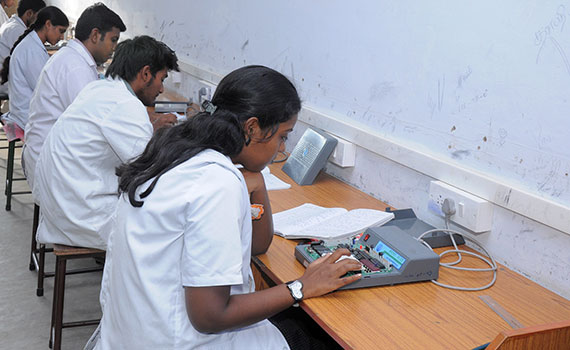

The Department of Electronics and Communication Engineering in Thangavelu Engineering College was established in the year 1995. The major driving force for the present day Information Technology revolution is the development in Electronics and Communication Engineering. The Department has the best facilities available in the region in terms of infrastructure including laboratories and faculty. Lectures, seminars, laboratory classes and tutorials form a large part of in-college academic activity. The Department imparts quality education to its students, in modern lecture rooms equipped with appropriate teaching aids.
To provide quality education in order to achieve employment to all our engineering graduates and to motivate our students to pursue higher education.
To provide quality and contemporary education in the domain of Electronics and Communication engineering through effective teaching and learning processes.
The B.E. Electronics and Communication Engineering was started in the year 1995. The basic principles and performance of Electronic devices and circuits are introduced in the course. Different analog and digital modulation techniques are used for communication. Equipment’s and systems are involved in wireless communications, satellite and optical communication technologies, computer communication and networking, design and development of microelectronic circuits for computation and processing, components and systems for Electronic instrumentation and control, etc. form major content of the course. The course also covers the study of hardware and interfacing of computer systems, programming skills and application of computers in signal processing and communication.
PEO 1: To impart knowledge to students on basic science, mathematics and electronics and communication engineering that would help them to understand the design and developmental concepts of electronics and communication engineering.
PEO 2: To inculcate a systematic approach to handle multi-faceted and multidisciplinary projects and to accomplish professional development.
PEO 3: To be able to appreciate new technological and cultural challenges by life-long learning through advanced degrees, publications, presentations, awards, etc.
1.The ability to apply Engineering knowledge in the development of electronics and communication engineering applications.
2. The capacity to analyze the problem to find and fix errors in the system.
3. The knowledge to provide valid conclusions in the specialized areas of electronics and communication by designing and developing a new applications.
4. The skill to showcase talent and find suitable employment.
5. The wherewithal to use modern tools to develop new applications and solve social problems.
6. The drive to practice professionalism at all times.
7. The ability to work and sustain in new environment.
8. The capacity to practice ethics and to execute the project efficiently maintaining economy.
9. The flair to function effectively as an individual, and as a member or leader in diverse teams, and in multi-disciplinary settings.
10. The knack to communicate effectively to team members and to the clients.
11. The talent to pursue higher education and adapt to new technologies.
12. The aptitude to excel in the chosen field and bring laurels to self, almamater and to the nation.
The Electronics and Communication Engineering field is a fertile one which is attracted by not only Students but also by industries. The Companies like IBM, Intel, Motorola, Sony Ericsson, Nokia, Samsung etc., have collaboration with India and giving a lot of openings to our Electronics and Communication engineers, The other prospects are VLSI Systems, Embedded System, Digital communication and its emerging areas are offering numerous opening for Electronics and Communication engineers. Also they find place in software and hardware Industries in India and abroad.
Regular guest lectures are conducted by professional bodies such IEEE and IEE. Students evince keen interest on mobile communication. Constant interaction between industry and institution enhances the knowledge in addition to the curriculum. Internship training is offered at leading manufacturing companies every weekend. Industrial visits are arranged to leading companies.
The M.E. Communication System course was started in the year 2013. In laboratories, students experiment with the latest technologies, which help them in kindling their latest skills. The students are encouraged to participate in State and National level symposia, extra-curricular activity and conference. They have won prizes in the above said activities.
The Department's laboratories include Linear Integrated circuits lab with function generators, Digital storage oscilloscopes, digital trainer kits, Microprocessor lab (8085 and 8086), communication lab, Radio frequency lab, Digital and system design lab, network lab. Optical communication lab has link A, link B, link-C, Link D and Link-E kits. The software available are multisim, Ulti sim, Mat lab, GPS kit, Windows 2000 server , Windows XP, Microsoft visual studio , Microsoft office 2000 professional, The department provides 2Mbps RF leased line Internet connectivity.

The department of Electronics and communication Engineering is equipped with seven laboratories. Each lab are approximately of 900 sq. ft. The labs include.
Fulfilling the Anna University curriculum and industry requirements, We are having several equipments such as Function generators, CRO, Multimeters, Digital and Analog IC testers, Digital trainer kits, microwave work bench setups, microprocessor and microcontroller kits etc.,. Several new software are also available in our labs which include Tanner, Pspice, Orcade 15.1, MASM, Xilinx 9.1, Matlab etc., The total worth of our labs is above 3 crores.
Project lab is established in the department to kindle and encourage the final year students to do in-house projects. To develop the practical and research knowledge, mini project exhibition was conducted by our department.
To encourage the students reading habits and use more reference books, department library also had been established. The department library is equipped with books all subjects, projects related and general books. This library is useful for the students as well as the staff members.
The Department is equipped with 10 mbps leased line Internet facility from Airtel.